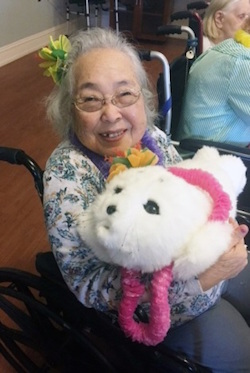
A robotic pet can be effective in decreasing wandering and anxiety-related behaviors in memory care residents, according to the results of a six-month study in seven Front Porch retirement communities in California.
“We continue to be astounded by the impact on mood, social interaction and communication,” said Davis Park, director of the Front Porch Center for Innovation and Wellbeing, who led the six-month study.
The therapeutic robot, known as Paro, was created in the likeness of a baby harp seal by Japanese engineer Takanori Shibata, Ph.D., a National Institute of Advanced Industrial Science and Technology and Massachusetts Institute of Technology AgeLab research fellow.
The study in Front’ Porch’s Summer House memory care neighborhoods, which included 920 documented interactions with the robot, “is the largest quantitative evaluation of Paro so far, and the outcomes show the benefits of Paro for improving the behavioral and psychological symptoms of dementia and reducing the usage of psychotropic medications,” Shibata said in a statement.
During the research period, caregivers and therapists were trained to understand and use the robot. Staff members used tracking surveys for every resident and corresponding intervention.
Use of the robot, according to the study:
- Produced calming effects for residents in 73% of wandering and 59% of anxious behaviors.
- Helped increase social behavior by 97% among isolated adults.
- Helped 153 out of 193 residents (79%) stay alert from initially sleepy behavior, resulting in improved moods, socialization and appetite.
- Was used to avoid psychotropic medications in 61% of cases when medications were considered.
“Front Porch is exploring creative solutions to address needs for which we currently don’t have an easy solution: agitation in the middle of the night, sundowning, engaging withdrawn or isolated residents,” said Kari Olson, chief innovation and technology officer for Front Porch and president of the Front Porch Center for Innovation and Wellbeing. Other methods being explored include adaptive technology, music therapy and telehealth, Olson said.



